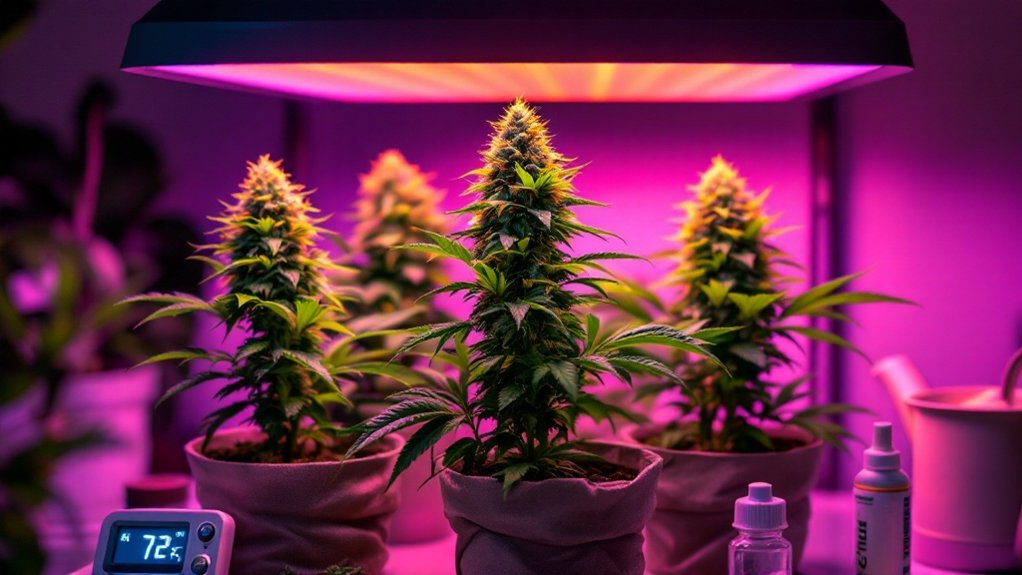Cannabusiness refers to commercial enterprises operating within the legal cannabis industry, including cultivation, processing, distribution, and retail operations. The sector is experiencing remarkable growth, projected to reach $45 billion by 2025 and expand to over $76 billion by 2030. With cannabis now legal for adult use in 24 states and enjoying 88% public support for nationwide legalization, the industry currently supports over 440,000 full-time jobs while generating approximately $20 billion in tax revenue. The evolving landscape offers significant opportunities within a complex regulatory framework.

As the cannabis market continues to expand across the United States, it now stands poised to reach nearly $45 billion in revenue by 2025, with projections indicating further growth to $76.39 billion by 2030. This remarkable trajectory represents a compound annual growth rate of 11.5% during the five-year period following 2025.
The industry has already demonstrated substantial economic impact, contributing approximately $115.2 billion to the U.S. economy in 2024 alone and experiencing a $2.6 billion increase in sales during the same year.
Cannabis’s economic footprint has reached $115.2 billion, with sales climbing $2.6 billion in 2024 alone.
A cannabusiness refers to any commercial enterprise involved in the cultivation, processing, distribution, or sale of cannabis and cannabis-derived products. These operations exist within a complex regulatory framework that continues to evolve across different jurisdictions. Currently, adult-use cannabis is legal in 24 U.S. states, reflecting growing public support that has reached a record high of 88% for nationwide legalization.
The presence of the U.S. farm bill has particularly supported expansion in hemp-derived products, while state-specific regulations continue to shape business operations and compliance requirements.
Consumer demographics reveal significant market penetration, with 47% of Americans having tried cannabis at least once and 15% classified as current users. More than one-third of women over age 21 now consume cannabis products, and 14% of Americans report using cannabis to support exercise regimens. The rise of pre-rolls as the fastest-growing product category demonstrates evolving consumer preferences, with sales increasing by 11.89% to over $4.1 billion in 2024.
Accessibility has improved dramatically, with 79% of Americans now living in counties with at least one dispensary.
The medical cannabis segment continues to expand, driven by increasing health awareness and applications in treating conditions like cancer. The FDA has approved cannabidiol drugs including nabilone and dronabinol specifically for managing chemotherapy-induced nausea and vomiting.
This growing therapeutic focus has spurred the development of university certification programs in cannabis medicine, agriculture, law, and business.
Economically, the industry supports 440,445 full-time equivalent jobs and generates approximately $20 billion in tax revenue—nearly double that of alcohol. Business optimism remains high, with 77% of cannabis companies anticipating year-over-year growth and 29% expecting sales increases of 50% or more in 2025.
Modern operational strategies show that dispensaries accepting debit payments average $4,627 more in revenue than cash-only establishments, even as average retail cannabis prices have declined by 32% since 2021. Banking challenges remain significant for the industry, with many businesses operating on an all-cash basis due to federal restrictions that impede access to traditional financial services.
The industry continues to progress toward greater inclusivity, with women and minority executive representation rebounding after previous declines. Celebrity partnerships, major manufacturer involvement, and increasing professionalization through education programs are further establishing cannabis as a legitimate and rapidly maturing business sector.
Frequently Asked Questions
How Do Banking Regulations Affect Cannabusinesses?
Federal prohibition of cannabis creates significant banking barriers for cannabusinesses, forcing many to operate cash-only.
Financial institutions serving these businesses must comply with stringent FinCEN guidelines, including extensive monitoring and Suspicious Activity Reports. This regulatory burden translates into higher fees, limited access to loans, and operational challenges.
While some state-chartered banks offer services, nationwide banking remains restricted, creating uneven market conditions and elevating security risks for cannabis companies handling large cash volumes.
What Licenses Are Required to Start a Cannabis Business?
Starting a cannabis business requires specific licenses that vary by state and operation type. The primary license categories include cultivator (for growing), manufacturer (for processing), retailer (for consumer sales), wholesaler, transporter, testing facility, and delivery service.
States also offer specialized licenses such as microbusiness and mezzobusiness permits that allow smaller-scale operations with different capacity limitations.
Applicants must complete formal applications through state systems, pay fees, undergo background checks, and provide thorough business documentation to obtain these licenses.
How Do Interstate Commerce Laws Impact Cannabis Distribution?
Interstate commerce laws greatly restrict cannabis distribution by classifying cannabis as a Schedule I substance federally, despite state-level legalization.
These restrictions prevent businesses from transporting cannabis products across state lines, creating isolated state markets that cannot achieve economies of scale.
Legal operators must establish separate cultivation, processing, and distribution systems in each state where they operate.
These limitations increase operational costs for legal businesses while inadvertently strengthening illicit markets that operate without such constraints.
What Insurance Options Exist for Cannabis Business Owners?
Cannabis business owners can access specialized insurance options designed for their unique risks. General liability, product liability, and commercial property insurance form the foundation of protection.
Additional coverage includes cannabis cargo insurance, budtenders professional liability, and product recall insurance. The market also offers crime and fidelity insurance, employment practices liability, and vape device coverage.
Insurance premiums tend to be higher than other industries due to perceived risks and the complex regulatory environment.
How Do Foreign Investments Work in the Cannabis Industry?
Foreign investments in the cannabis industry operate within a complex legal framework due to the conflict between federal and state laws in the U.S. Investors must navigate federal prohibitions while adhering to state-level regulations.
Foreign nationals face immigration considerations when investing in cannabis businesses, as involvement may affect visa status or entry eligibility.
Regional regulations often impose ownership restrictions, such as Puerto Rico’s 51% local capital requirement.
Passive investments typically present fewer legal complications than active operational involvement.









